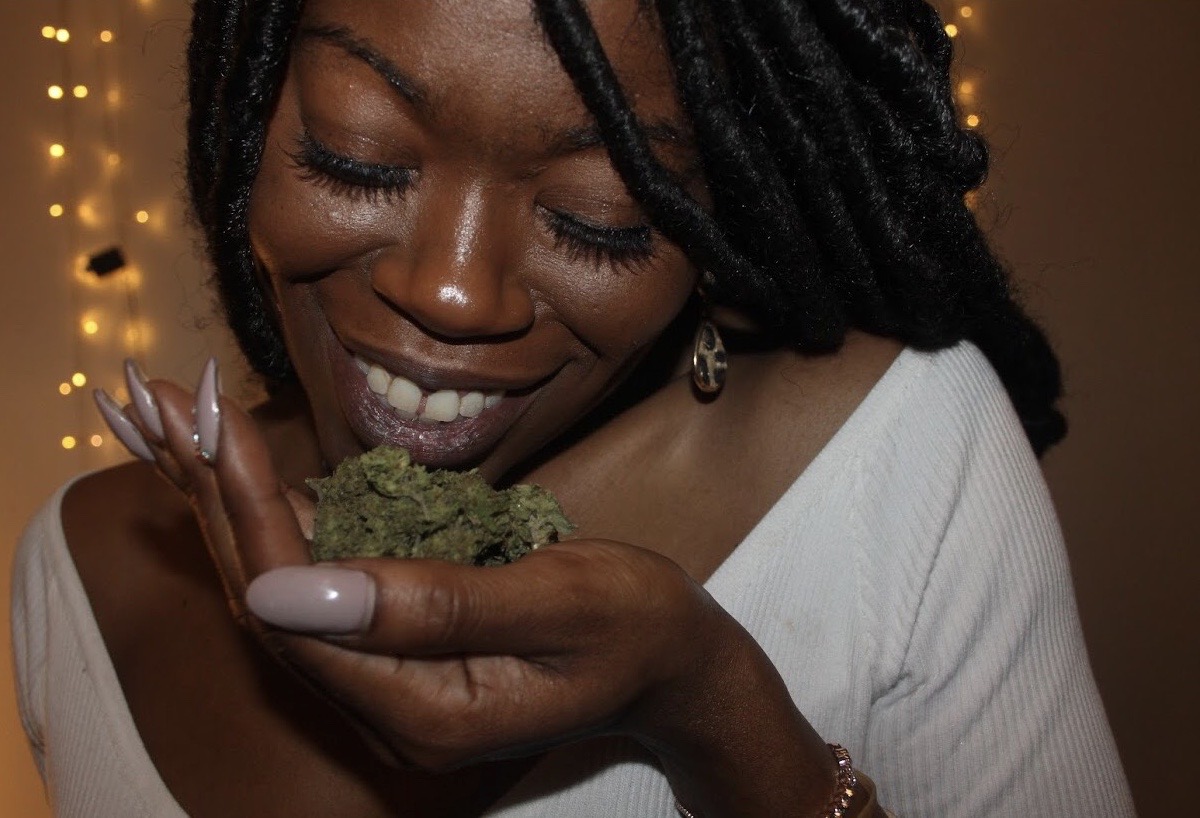
Pictured above: Sheena Roberson of Cannabis Noire. Written by Lyneisha Watson
Leaders throughout the cannabis industry continuously use the term “social equity.” But there is still a lack of understanding as to why it’s important for Black Americans.
Sheena Roberson, founder of Cannabis Noire—a company that helps marginalized groups gain access to the cannabis industry—knows that elevating the lives of Black Americans begins by destroying oppressive narratives.
 A War Against Minorities
A War Against Minorities
In September 2019, Roberson hosted Philadelphia’s inaugural National Expungement Week (NEW). She saw this as an opportunity to stand up for the victims of systematic oppression while creating a path forward.
“As a young woman, I knew early on that I wanted to be more active in the [North Philadelphia] community,” Roberson tells the Emerald. “[Because of the] epidemic levels of gun violence, I’ve lost family members, friends and neighbors. [Gun violence has] created a sense of terror throughout the community.”‘
Roberson’s work isn’t just about putting an end to gun violence in Black neighborhoods. It’s about helping sustain the lives of Black Americans. In particular, Roberson’s activism highlights how the War on Drugs is really a, “war against minorities.”
Stopping the Cycle

“One young man who attended our dine and dialogue on mental health and cannabis—an event designed to shed light on mental health obstacles, cannabis use, and how the two can be connected—spoke candidly about his struggle to survive after [he was incarcerated] for cannabis possession,” shares Roberson. “He was struggling to find a place to live.”
The man and his family weren’t allowed to live in public housing. He couldn’t find a job or go to school, either. It seemed that his only option was to return to the streets, or back to jail.
He didn’t know what else to do, Roberson says. “It was a poignant reminder of how easily [Black Americans] fall through the cracks of the criminal justice system and how little resources, if any, are being given and distributed properly to us.”
“It was an indescribable feeling to [see] our event sponsors embrace this young man with services and support that could help him that day. In turn, “It gave him and the people in attendance hope,” she continues. “This is proof that if this industry truly wants to make a difference in the Black community, then they absolutely can.”
Overall, NEW provided services to 450 people in 2018; 298 of which begin the process of clearing their records. They also provided $3 million in economic benefits.
Limited Access to the Industry
Expungement and cannabis laws are different in every state. In some, for example, Black Americans have access, albeit limited, to participate in the industry. In others, however, the War on Drugs is still creating instability.
“There are all sorts of ways in which […] this hyper-incarceration of people of color is impacting our lives,” says Opal Tometi, co-founder of Black Lives Matter.
“The movement to decriminalize the use of marijuana has grown and it’s incredible,” Tometi adds. “But, the reality is that people of color have been left out of formal economies, and have had to turn to these industries over the years in order to make a living.”
“It’s hard for communities of color to access the same types of job opportunities in this industry,” explains Tometi. “Oftentimes because of their record […]. They aren’t able to engage in the same economy that led them to be behind bars. So this contradiction is stark and exists, and it’s something that we need to deal with.”
Roberson notes that, “the systematic obstacles that minorities face aren’t just retarding our communities. They’re impeding the growth of industries like cannabis.”
Justice Reserved for the Fair Skinned
Despite comparable usage rates, Black Americans are four times more likely to be arrested for cannabis than whites. Unfortunately, time and time again, this country has shown us that justice is only reserved for those of fairer skin.
Roberson and Tometi are manifesting a country where social equity actually exists. Black American’s who advocate for criminal justice reform understand that sustaining their communities begins by destroying the murderous narratives that have kept them bound inside the matrix for so long.
These activists remind us that reform in the U.S. begins by giving Black Americans the resources needed to finally experience the luxury of living in the “Land of the Free.”



Leave a Reply